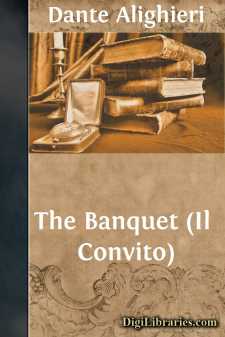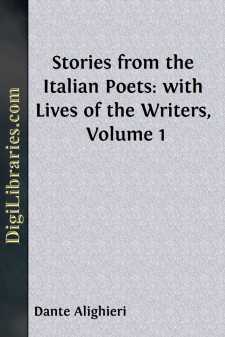Categories
- Antiques & Collectibles 13
- Architecture 36
- Art 48
- Bibles 22
- Biography & Autobiography 813
- Body, Mind & Spirit 142
- Business & Economics 28
- Children's Books 15
- Children's Fiction 12
- Computers 4
- Cooking 94
- Crafts & Hobbies 4
- Drama 346
- Education 46
- Family & Relationships 57
- Fiction 11828
- Games 19
- Gardening 17
- Health & Fitness 34
- History 1377
- House & Home 1
- Humor 147
- Juvenile Fiction 1873
- Juvenile Nonfiction 202
- Language Arts & Disciplines 88
- Law 16
- Literary Collections 686
- Literary Criticism 179
- Mathematics 13
- Medical 41
- Music 40
- Nature 179
- Non-Classifiable 1768
- Performing Arts 7
- Periodicals 1453
- Philosophy 64
- Photography 2
- Poetry 896
- Political Science 203
- Psychology 42
- Reference 154
- Religion 513
- Science 126
- Self-Help 84
- Social Science 81
- Sports & Recreation 34
- Study Aids 3
- Technology & Engineering 59
- Transportation 23
- Travel 463
- True Crime 29
The Banquet (Il Convito)
by: Dante Alighieri
Description:
Excerpt
INTRODUCTION.
This translation of Dante's Convito—the first in English—is from the hand of a lady whose enthusiasm for the genius of Dante has made it a chief pleasure of her life to dwell on it by translating, not his Divine Comedy only, but also the whole body of his other works. Among those works the Vita Nuova and the Convito have a distinct place, as leading up to the great masterpiece. In the New Life, Man starts on his career with human love that points to the divine. In the Banquet, he passes to mature life and to love of knowledge that declares the power and the love of God in the material and moral world about us and within us. In the Divine Comedy, the Poet passes to the world to come, and rises to the final union of the love for Beatrice, the beatifier, with the glory of the Love of God. Of this great series, the crowning work has, of course, had many translators, and there have been translators also of the book that shows the youth of love. But the noble fragment of the Convito that unites these two has, I believe, never yet been placed within reach of the English reader, except by a translation of its poems only into unrhymed measure in Mr. Charles Lyell's "Poems of the Vita Nuova and the Convito," published in 1835.
The Convito is a fragment. There are four books where fifteen were designed, including three only of the intended fourteen songs. But the plan is clear, and one or two glances forward to the matter of the last book, which would have had Justice for its theme, show that all was to have been brought to a high spiritual close.
Its aim was no less than the lifting of men's minds by knowledge of the world without them and within them, bound together in creation, showing forth the Mind of the Creator. The reader of this volume must not flinch from the ingenious dialectics of the mediæval reasoner on Man and Nature. Dante's knowledge is the knowledge of his time. Science had made little advance since Aristotle—who is "the Philosopher" taken by Dante for his human guide—first laid its foundations. It is useful, no doubt, to be able in a book like this, shaped by a noble mind, to study at their best the forms of reasoning that made the science of the Middle Ages. But the reader is not called upon to make his mind unhappy with endeavours to seize all the points, say, of a theory of the heavens that was most ingenious, but in no part true. The main thing is to observe how the mistaken reasoning joins each of the seven sciences to one of the seven heavens, and here as everywhere joins earth to heaven, and bids man lift his head and look up, Godward, to the source of light. If spiritual truth could only come from right and perfect knowledge, this would have been a world of dead souls from the first till now; for future centuries, in looking back at us, will wonder at the little faulty knowledge that we think so much. But let the known be what it may, the true soul rises from it to a sense of the divine mysteries of Wisdom and of Love. Dante's knowledge may be full of ignorance, and so is ours....



